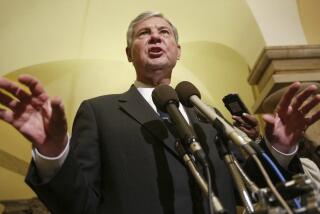‘B-1 Bob’ Vs. Democrats’ Darling, Round II
- Share via
In Washington, where moving legislation means slogging through months of committee work and waiting, sometimes decades, to build power, Robert K. Dornan never bothered to bide his time.
During nine terms in Congress, the contentious conservative chose his own way: He bullied, he yelled, he exposed, he insulted and he debated.
The strategy made Dornan a conservative icon to legions of Republicans across the country but limited his impact on Capitol Hill to that of a high-decibel backbencher, better known for his rapid-fire mouth than for his leadership or skill in writing legislation.
He left Congress in 1996, defeated by Rep. Loretta Sanchez, without having written a single bill that became law.
But Dornan’s style didn’t make him a poor congressman. He learned early and well how to use the bully pulpit to keep issues he cared about in the public debate, and he earned his greatest successes not in committee or in budget debates but in the public arena.
“You have three choices when you’re in Congress. You can be a district person, be very attentive to the needs of your district, you can be a committee person and become known for very substantive work on policy issues, or you can be a Bob Dornan and get your name out there,” said Jack Pitney, professor of political science at Claremont McKenna College.
“It’s a classic strategy, to just keep your issues alive. It’s hard to point out a specific legislative accomplishment [of Dornan’s], but the issues he cares about got a lot more attention than they would have if it hadn’t been for Dornan.”
Dornan, now fighting to win back the central Orange County seat in one of the hottest, most expensive congressional races in the nation, embraced that tactic with gusto.
He translated his support for prisoners of war into the POW bracelet, which was widely worn for years by supporters of the POW/MIA cause across the country.
He worked against abortion by marching on Washington every year with anti-abortion forces. He sought support for military spending by piloting fighter jets in front of waiting cameras and for “freedom fighters” in Central America by visiting guerrilla camps.
“I believe I had a significant congressional piece of winning the Cold War,” Dornan said. “I was an uncompromising anti-Communist warrior, and I fought the Carter administration all four years not to hollow out our military any more than they did.”
A Relentless Champion of Conservative Issues
Dornan also was unyielding in his stands against gay rights, feminism, communism and liberalism, and fervent in his support for the military and gun rights. He proposed higher pay for members of the military and battled for smaller government and lower taxes. Outraged by reports of international torture of the imprisoned, he was a strong advocate of Amnesty International.
He fought against federal funds for AIDS education, saying the money went for programs that promoted homosexuality. He proposed a bill limiting the role of women in combat. He fought for years to ban abortions in military hospitals and to end the use of fetal tissue in research, but his proposals went nowhere. He introduced a constitutional amendment to ban abortion.
Dornan also battled to keep illegal immigrants out of the country and pushed to deny them some social services. He advocated the repeal of all income, corporate and inheritance taxes and the abolition of the Internal Revenue Service. He supported a flat tax and, eventually, a national sales tax.
“He was known for never backing down off an issue of principle, much to the distraction of people who would have preferred to go quietly into the night,” said Terry Holt, spokesman for the House Republican caucus.
“Traditionally in our party, there are a few spokespeople who rise and speak to the most conservative groups in the party, and Dornan did that,” he said.
Dornan was attacked by environmental groups as among the worst offenders in Congress. In his last term, Dornan sought unsuccessfully to overturn President Clinton’s “don’t ask, don’t tell” policy on gays in the military. He was defeated in a bid to impose costly requirements on the federal government to investigate the claims of POW/MIA families.
The strategy sometimes worked, said Marshall Wittmann, director of congressional relations for the Heritage Foundation, a conservative think tank.
“It’s one thing to sit in a committee room and make sure your provision gets in the bill. Another role of a congressman is to be a pest and get in everyone’s face to make sure that the issues you’re concerned about are not forgotten,” Wittmann said.
“Dornan was clearly the type who, when he got a burr under his saddle, would not let anything deter him,” he said. “That was aggravating to the [congressional] leadership but oftentimes kept the issue from getting buried.”
Openly more interested in national and foreign policy than in the minutiae of issues in his central Orange County district, Dornan stayed away from California for months at a time, living in a spacious house in suburban Virginia and traveling the world, sometimes at taxpayer expense, to witness wars and rebellions first-hand. Unlike Sanchez, who has been ubiquitous in the district on weekends, he rarely attended community events.
But Dornan nevertheless secured millions of dollars in federal funding for crime-fighting, transportation and veterans programs for the voters who elected him.
“When my cities asked me to jump, I said, ‘How high?’ ” Dornan said. “There wasn’t anything I was ever asked to do that I didn’t come through for my district.”
He helped get $2.5 million in federal funds to redevelop a shabby section of Garden Grove and successfully lobbied for money to improve Orange County highways and streets. He fought for what eventually became more than $122 million for the Santa Ana River Flood Control Project.
He worked successfully for money to widen Bristol Street in Santa Ana, a project for which Sanchez has secured additional money. He helped secure funding for a new federal courthouse in Santa Ana.
“He was a good bread-and-butter congressman. He was very strong. Bob Dornan always had an excellent staff working on district-related projects,” said Stan Oftelie, former director of the Orange County Transportation Authority.
“It’s not very comfortable for me as a Democrat to say this, but Bob Dornan always brought home the bacon.”
Dornan often would testify in front of congressional committees on Orange County issues he supported, even those not related to his district, Oftelie said.
Another Democrat, Anaheim Mayor Tom Daly, a close Sanchez ally who was employed by her in 1997 to set up her Garden Grove congressional office, said Dornan was instrumental in securing some funding for his city.
“His staff generally listened when we came to him for funds,” Daly said. “But we limited what we asked for.”
Rep. Dana Rohrabacher (R-Huntington Beach), who has had chilly relations with Dornan in the past despite sharing many of the same views, called his former colleague “exceptionally energetic” in trying to get funds for the district.
But to many in central Orange County, Dornan was too seldom seen and too often heard, mostly on television from Washington.
“He didn’t do much. He was always out there flying fighter jets or something. That’s what I remember,” Anaheim resident Berdj Hatsak said. “Who needs it?”
Dornan enjoyed solid support from many in the Vietnamese American community in his district. But those relations became strained during the fight for recognition by former South Vietnamese commandos employed by the U.S. during the Vietnam War.
Dornan says he went out of his way to push the commandos’ case. But John Mattes, the attorney representing the commandos, said Dornan did not step in until 1996, three years after he was first asked in a letter for help.
When the commandos did get the recognition they had sought, it was Sanchez, not Dornan, who introduced the legislation that became law.
In Washington, Dornan was welcomed by other conservatives for his vote, but he often was viewed as an embarrassment by Republican moderates. In its 1996 Congressional Survey, National Journal magazine said Dornan had voted in favor of conservative causes and against liberal ones 88% to 91% of the time over the course of his career.
A Headline-Grabber, ‘Not a Workhorse’
For years the former Air Force pilot, “B-1 Bob” to friends and foes alike, was a top proponent of military spending on the bomber and other hardware. His issues sometimes were taken on by other Republicans with more power than Dornan, but more often, he was relegated to holding forth in an empty House chamber, his words heeded more by avid late-night C-SPAN mavens than by his fellow legislators.
When Republicans swept into majority status in the House in 1994, Dornan at last earned some power. He became chairman of two subcommittees, one on military personnel, the other on technical and tactical intelligence. He used the platform to hold hearings on some of the issues dearest to him but, despite his seniority, was not able to move legislation.
“He didn’t have a reputation as a powerful guy in the leadership, as an expert in a specific area where both sides of the aisle look to him for advice. He was not a guy who reached out and built coalitions,” said James Thurber, director of the Center of Congressional and Presidential Studies at American University.
“I think he has been an embarrassment from time to time for his party because of his maverick, show-horse style. He went after the headlines. He was not a workhorse behind the scenes,” Thurber said.
Dornan may not have been a workhorse, but he knew how to play to his strengths. One former Bush administration official recalled Dornan often buttonholing other members of Congress on the House floor to lobby them on various issues.
On foreign affairs issues, Dornan used his prodigious memory for facts and historical knowledge to overwhelm opponents in debates.
“When I first came here in 1978, I went to him because it was obvious that his knowledge of the issues that were important to us back then during the Cold War was absolutely invaluable,” said Rep. Gerald B.H. Solomon (R-N.Y.).
“I guess the best way to size up Bob Dornan were the words ‘due diligence.’ He was always prepared.”
Holt, the GOP caucus spokesman, said Dornan’s preparation and penchant for harsh rhetoric had served Republicans well, particularly in the Reagan and Bush years when Dornan had close ties to the White House and was a forceful proponent of heightened national security.
“When he goes down to the floor and he talks about Vietnam veterans, or he talks about national security, he gets absolutely rave reviews from Republicans,” Holt said. “At the same time, I don’t know a member who has not been peeved with him at one point or another.”
Getting people angry never bothered Dornan.
“I learned that to move policy, I had to have an audience,” Dornan said. “Sure, I made people angry. That was the point. I was angry too.”
* FAR RIGHT
Interest groups rate Dornan’s stance on target issues. Also, highlights of his voting record on key legislation. B3
More to Read
Get the L.A. Times Politics newsletter
Deeply reported insights into legislation, politics and policy from Sacramento, Washington and beyond. In your inbox twice per week.
You may occasionally receive promotional content from the Los Angeles Times.









